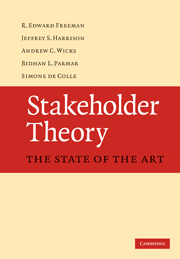Book contents
- Frontmatter
- Contents
- List of figures
- List of tables
- Acknowledgements
- Preface
- Part I The genesis of stakeholder theory
- Part II Stakeholder theory and the traditional disciplines of business
- Part III Stakeholder theory, ethics, and corporate social responsibility
- Part IV Stakeholder theory: some future possibilities
- 9 Stakeholder theory and capitalism
- 10 Questions on the horizon
- Bibliography
- Index
10 - Questions on the horizon
from Part IV - Stakeholder theory: some future possibilities
Published online by Cambridge University Press: 05 June 2012
- Frontmatter
- Contents
- List of figures
- List of tables
- Acknowledgements
- Preface
- Part I The genesis of stakeholder theory
- Part II Stakeholder theory and the traditional disciplines of business
- Part III Stakeholder theory, ethics, and corporate social responsibility
- Part IV Stakeholder theory: some future possibilities
- 9 Stakeholder theory and capitalism
- 10 Questions on the horizon
- Bibliography
- Index
Summary
The argument in the preceding chapters is that the body of work that we have called stakeholder theory can be seen as articulating a different and morally rich way of thinking about the disciplines of business. We have suggested in Chapter 9 that it offers no less than a thoroughgoing revision of our understanding of business and capitalism. Whether or not stakeholder theory fulfills these promises will be determined more by the work of the next thirty years than by the work that has already been done. Therefore we want to set out briefly a set of research questions and themes that point stakeholder theory and the researchers who work in this area towards what we see as some fruitful areas of inquiry. We do this in the pragmatic spirit of experimentalism. We should explore many more areas than the ones suggested here, keep what works, and discard the projects that lead to dead ends.
In Chapter 1 we argued that the language of stakeholders has been developed to address three important and interrelated questions about business: how value is created, the nature of the relationship between ethics and capitalism, and how managers can best think about their day-to-day practices.
The pursuit of these questions raises many more. We believe that the vocabulary of stakeholders is not only good for addressing these three purposes, but for creating new opportunities for practical and theoretical development as well. Stakeholder language opens more intellectual design space.
- Type
- Chapter
- Information
- Stakeholder TheoryThe State of the Art, pp. 286 - 291Publisher: Cambridge University PressPrint publication year: 2010

